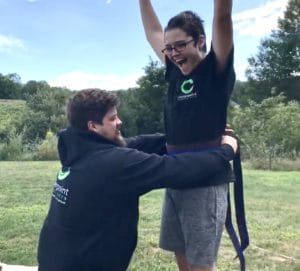Hidden Curriculum
By CPMAstudio In InsightHidden Curriculum
Centerpoint’s team is the strongest that is has ever been. I’ve personally learned a great deal in the past few weeks from watching how they solve problems and take on new responsibilities through both formal and informal discussions. Samantha Berry was a camp counselor this summer and is now part of the EduCamp team learning Karate alongside her fellow teammates, Nicole Lovejoy and Kathryn Nagle. In a recent post-class discussion, she introduced us to a powerful new term, “Hidden Curriculum”, and it’s revolutionized how we think about education here at Centerpoint.
“Hidden Curriculum” are the lessons, values and practices that students learn informally and often unintentionally at school. These can include everything from unspoken cues about how to ask questions or complete assignments, to gender roles, to the development of crucial life skills through simple social interactions with teachers and other students. It’s a new and somewhat controversial topic in education because it discusses the difference between the educational culture we intend to teach and what students actually learn. Hidden curriculum also takes a close look at how students influence each other’s learning. There’s a lot to it, and I’m truly fascinated by the whole concept.
Hidden Curriculum is particularly interesting to me right now because Covid-19 has made Centerpoint’s role as an educational organization much more important. We now have children spending significant amounts of their day with us as we support their on-line education. Our Karate Classes and our Life Skills Curriculum, formerly important adjuncts to their lives, are now driving big chunks of their day, and directly impacting their academic progress. It’s a major responsibility, and it is forcing us to ask big questions about our little studio. Our focus is creating a school culture that truly fosters and supports life skills, directly and indirectly.
Fortunately, the kids are showing a remarkable level of adaptability and resilience, and are learning how to work together, teach other and get along. We are doing our best to support that. Our goals are very simple; creating a culture where they know to ask for help if they need it (from staff or from other kids), to help each other with social distancing and keeping clean, that it is OK to be a little overwhelmed from time-to-time, and to only do one thing at a time. We look forward to sharing our discoveries with you in the weeks and months ahead.




